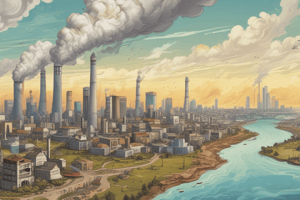Podcast
Questions and Answers
What is a source of soil pollution?
What is a source of soil pollution?
- Urban planning
- Agricultural chemicals (correct)
- Proper waste disposal
- Industrial waste recycling
What is a health effect of soil pollution?
What is a health effect of soil pollution?
- Respiratory diseases
- Skin cancer
- Ingestion of contaminated soil particles (correct)
- Cardiovascular disease
What is a source of noise pollution?
What is a source of noise pollution?
- Silent meditation
- Forest conservation
- Urban gardening
- Transportation (correct)
What is an environmental effect of soil pollution?
What is an environmental effect of soil pollution?
What is a health effect of noise pollution?
What is a health effect of noise pollution?
What is the primary source of nitrogen oxides (NOx) in the atmosphere?
What is the primary source of nitrogen oxides (NOx) in the atmosphere?
What is a common health effect of water pollution?
What is a common health effect of water pollution?
Which type of pollution is responsible for acid rain?
Which type of pollution is responsible for acid rain?
What is a common environmental effect of soil pollution?
What is a common environmental effect of soil pollution?
Which of the following is NOT a source of air pollution?
Which of the following is NOT a source of air pollution?
Which type of pollutant is responsible for respiratory problems?
Which type of pollutant is responsible for respiratory problems?
Flashcards are hidden until you start studying
Study Notes
Air Pollution
- Definition: The presence of substances in the atmosphere that can cause harm to humans, animals, and the environment.
- Sources:
- Natural: volcanic eruptions, wildfires
- Human-made: industrial processes, vehicle emissions, fossil fuel combustion
- Pollutants:
- Particulate matter (PM): tiny particles that can cause respiratory problems
- Nitrogen oxides (NOx): contribute to smog and acid rain
- Sulfur dioxide (SO2): causes acid rain and respiratory issues
- Ozone (O3): a secondary pollutant formed from NOx and volatile organic compounds (VOCs)
- Health effects:
- Respiratory problems (asthma, COPD)
- Cardiovascular disease
- Neurological damage
- Environmental effects:
- Acid rain
- Climate change
- Ecosystem disruption
Water Pollution
- Definition: The contamination of water bodies, including rivers, lakes, and oceans.
- Sources:
- Agricultural runoff (fertilizers, pesticides)
- Industrial waste
- Sewage and wastewater
- Oil spills
- Pollutants:
- Chemicals (pesticides, heavy metals)
- Bacteria and viruses
- Nutrients (excess nitrogen and phosphorus)
- Health effects:
- Waterborne diseases (cholera, typhoid fever)
- Cancer and other health problems from chemical exposure
- Environmental effects:
- Habitat destruction
- Disruption of aquatic ecosystems
- Impact on aquatic life
Soil Pollution
- Definition: The contamination of soil, affecting its fertility and quality.
- Sources:
- Industrial waste
- Agricultural chemicals (pesticides, fertilizers)
- Mining and drilling activities
- Improper waste disposal
- Pollutants:
- Heavy metals (lead, mercury)
- Organic pollutants (PCBs, dioxins)
- Radioactive substances
- Health effects:
- Ingestion of contaminated soil particles
- Exposure to toxic substances through skin contact
- Environmental effects:
- Soil degradation
- Reduced fertility and crop yields
- Disruption of ecosystem processes
Noise Pollution
- Definition: Unwanted or excessive sounds that can cause harm to humans and wildlife.
- Sources:
- Transportation (aircraft, vehicles, trains)
- Industrial activities
- Construction and demolition
- Recreational activities (music, fireworks)
- Effects:
- Hearing loss and tinnitus
- Cardiovascular disease
- Stress and anxiety
- Disruption of wildlife behavior and habitats
Air Pollution
- Air pollution is the presence of substances in the atmosphere that can cause harm to humans, animals, and the environment.
- Natural sources of air pollution include volcanic eruptions and wildfires.
- Human-made sources include industrial processes, vehicle emissions, and fossil fuel combustion.
- Particulate matter (PM) is a pollutant that can cause respiratory problems.
- Nitrogen oxides (NOx) contribute to smog and acid rain.
- Sulfur dioxide (SO2) causes acid rain and respiratory issues.
- Ozone (O3) is a secondary pollutant formed from NOx and volatile organic compounds (VOCs).
- Air pollution can cause respiratory problems, cardiovascular disease, and neurological damage.
- Air pollution also contributes to acid rain, climate change, and ecosystem disruption.
Water Pollution
- Water pollution is the contamination of water bodies, including rivers, lakes, and oceans.
- Agricultural runoff (fertilizers, pesticides) is a source of water pollution.
- Industrial waste, sewage, and oil spills also contribute to water pollution.
- Chemicals (pesticides, heavy metals), bacteria, and viruses are common pollutants in water.
- Nutrients (excess nitrogen and phosphorus) can also pollute water bodies.
- Water pollution can cause waterborne diseases, cancer, and other health problems.
- Water pollution also leads to habitat destruction, disruption of aquatic ecosystems, and impact on aquatic life.
Soil Pollution
- Soil pollution is the contamination of soil, affecting its fertility and quality.
- Industrial waste, agricultural chemicals, mining, and drilling activities can pollute soil.
- Heavy metals (lead, mercury), organic pollutants (PCBs, dioxins), and radioactive substances are common soil pollutants.
- Soil pollution can cause ingestion of contaminated soil particles and exposure to toxic substances through skin contact.
- Soil pollution leads to soil degradation, reduced fertility, and crop yields, and disrupts ecosystem processes.
Noise Pollution
- Noise pollution is unwanted or excessive sounds that can cause harm to humans and wildlife.
- Transportation (aircraft, vehicles, trains), industrial activities, construction, and recreational activities generate noise pollution.
- Noise pollution can cause hearing loss, tinnitus, cardiovascular disease, and stress and anxiety.
- Noise pollution also disrupts wildlife behavior and habitats.
Studying That Suits You
Use AI to generate personalized quizzes and flashcards to suit your learning preferences.




